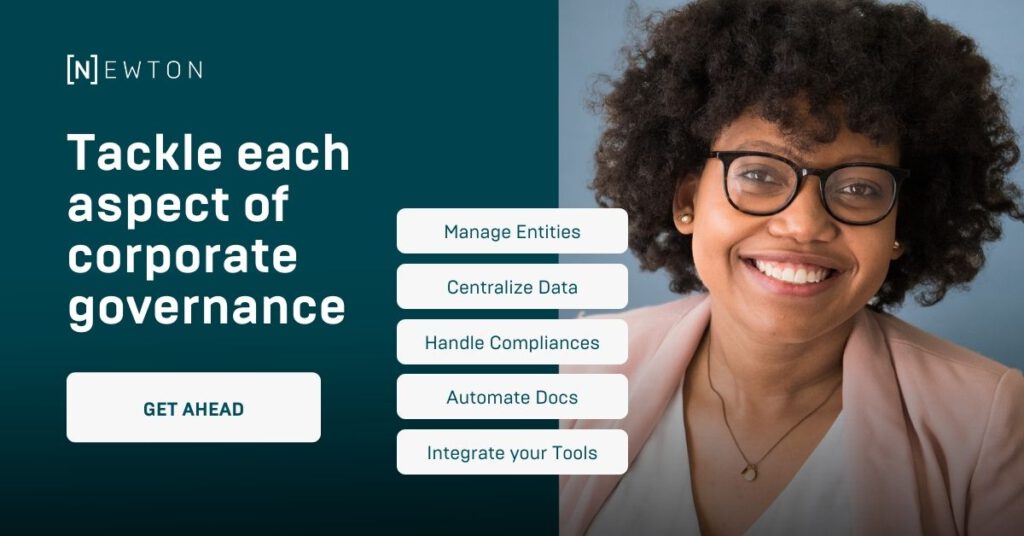
Knowledge management is crucial for the success of a legal team. Here’s what you need to know.
Dear Legal Ops!
Welcome to this week’s Let’s talk about Legal Ops, offered by NEWTON. We tackle corporate legal departments, speed up processes, and career growth. Please send us your questions; in return, we come back with real insights and actionable tips.
If you find this post valuable, don’t miss the chance to check out our latest posts.
- How to Copy Entity Data from NEWTON into Emails or Documents
- Maximizing Transparency and Compliance with Legal Entity Management: The Power of Automated Visual Charts
- Getting SOC2 and ISO27001 ready
Get the Latest NEWTON News
Don’t miss out on the latest NEWTON features, updates, and improvements. Subscribe to our newsletter and stay informed about everything NEWTON—new tools, enhanced functionality, and fixes that make compliance management easier for your business!
In the fast-paced world of legal operations, effective knowledge management is crucial for legal teams who want to streamline their processes, improve productivity, and enhance decision-making.
As legal professionals, it’s easy to understand the critical role that knowledge plays in the success of your team and organization; and in today’s rapidly changing landscape, having easy access to relevant information, expertise, and best practices is more important than ever. This is a strong contributor as to why
we’re likely to see legal departments replacing 20% of generalist lawyers with non-lawyer staff by 2024.
But what exactly is “knowledge management”? And how can it influence the performance of your legal department? In this article, we’ll explore various aspects of knowledge management, including the key principles and best practices.
Whether you are just starting your knowledge management journey or looking to optimize your existing practices, we hope this article will equip you with the insights and guidance needed to unlock the full potential of your team’s knowledge.
In this article, we will cover the following:
What is knowledge management?
Knowledge management is about creating a system and culture that allows you to harness the power of knowledge to drive success.
According to CLOC, knowledge management is about tapping into the knowledge and capability of your entire organization. It refers to the systematic collection, organization, storage, and dissemination of both legal and non-legal knowledge within a legal team and the wider business.
Knowledge management is all about capturing and leveraging the legal team’s collective expertise, experiences, and knowledge to facilitate efficient and informed decision-making. Where legal departments were once flooded with knowledge and processes, knowledge management aims to help you find and preserve that knowledge and information. CLOC explains that most legal teams rely on “tribal knowledge” to achieve this, but this isn’t feasible as the team scales.
Instead, with the goal of improving the efficiency and performance of legal operations, bringing effective knowledge management makes it easier to find answers and best practices. It often involves creating and maintaining a centralized repository of legal documents, including contracts, agreements, policies, and legal research materials. This valuable repository enables quick access to relevant information, promotes consistency, and reduces the risk of errors or redundancies.
A critical aspect of knowledge management is the ability to capture insights and information, which is the expertise and insights gained through years of experience, both internal and external, to the legal team. This includes documenting best practices, case studies, and lessons learned to foster knowledge sharing and collaboration among team members, ultimately leading to continual productivity and performance improvement. By preserving and sharing this valuable tacit knowledge, legal teams can continuously avoid reinventing the wheel and enhance their overall efficiency and effectiveness.
In addition to storage and sharing, knowledge management encompasses technology solutions, such as legal research databases, document management systems, and collaboration platforms. These tools facilitate the organization, searchability, and retrieval of information, ensuring that the legal team can quickly locate relevant resources and stay up-to-date with changes in laws, regulations, and industry standards.
Why is knowledge management important?
Knowledge management plays a crucial role in the success of legal teams for several reasons.
Enhanced efficiency
Effective knowledge management allows legal teams to efficiently access and leverage relevant information, documents, and expertise. This streamlines workflows, reduces time spent searching for information, and enables quicker decision-making, ultimately increasing overall efficiency.
Consistency and standardization
Knowledge management ensures consistency and standardization in legal processes, templates, and best practices. By centralizing and organizing knowledge, legal teams can maintain a unified approach, minimizing errors and promoting quality assurance across the organization. Not to mention, it makes it a lot easier to onboard new employees and have them up to speed quickly.
Risk mitigation
Access to comprehensive, accurate, and up-to-date knowledge is vital in risk management. Knowledge management enables legal departments to stay informed about laws, regulations, and industry standards changes. This ensures compliance and reduces the risk of legal errors, regulatory violations, and potential lawsuits.
Collaboration and knowledge sharing
Legal teams often work in collaboration with other teams (internally or externally) on complex matters or across different locations. Knowledge management platforms and practices facilitate seamless collaboration and knowledge sharing, enabling team members to leverage each other’s expertise, insights, and experiences. This promotes a culture of learning, innovation, and continuous improvement within the team.
Succession planning
Knowledge management helps mitigate the risks associated with personnel changes, such as retirements or team members leaving the organization. By capturing and organizing knowledge, legal teams can ensure that critical information and expertise are retained, allowing for a smooth transition and effective continuity of operations.
Client service and value creation
Effective knowledge management enables legal teams to provide better client service. Quick access to relevant information, templates, precedents, etc., allows for more informed and strategic advice, enhancing client value. It also enables legal teams to proactively identify opportunities and deliver innovative solutions based on collective knowledge and insights.
Knowledge management is essential for legal teams to operate efficiently, mitigate risks, deliver high-quality services, foster collaboration, and drive value creation. By leveraging the power of knowledge, legal teams can stay competitive, adapt to changing environments, and meet the evolving needs of their organizations and clients.
Getting started with knowledge management
No matter the size of your legal function, there are steps you can take to improve your knowledge management. We highly recommend you check out ACC’s maturity model, which explores what knowledge management looks like at early, intermediate or advanced stages. You can find that here.
In the meantime, good knowledge management practices for in-house legal teams are built on the following key principles.
1. Capture and centralize knowledge
Establish a system to capture and centralize legal knowledge, including documents, templates, research materials, and best practices. This can be achieved through a centralized knowledge repository or a digital platform that allows easy storage, organization, and information retrieval.
2. Categorize and organize
Implement a logical and consistent categorization system to organize knowledge assets. Use clear and intuitive labels, tags, or metadata to enable efficient searching and retrieval of information. Ensure that the categorization aligns with the needs and context of the legal team. Depending on the size of your business, non-legal workers may also be required to access your knowledge base. Keep this in mind when designing your knowledge management.
3. Standardize templates and processes
Establish standardized templates, processes, and workflows to ensure consistency and efficiency across the legal team. Document best practices and guidelines, making them easily accessible to team members. Regularly update and refine these resources based on feedback and evolving needs.
4. Encourage knowledge sharing
Foster a culture of knowledge sharing within the legal team. Encourage team members to actively contribute their insights, experiences, and expertise to the knowledge repository. Provide platforms or tools that facilitate collaboration and knowledge exchange, such as discussion forums (e.g. on your internal messenger such as Slack or Teams), shared document spaces, or internal wikis.
5. Promote continuous learning
Encourage continuous learning and professional development within the legal team. Provide opportunities for training, workshops, and knowledge-sharing sessions. Foster a supportive environment where team members are motivated to expand their knowledge and stay up-to-date with legal developments.
6. Leverage technology
Get the Latest NEWTON News
Don’t miss out on the latest NEWTON features, updates, and improvements. Subscribe to our newsletter and stay informed about everything NEWTON—new tools, enhanced functionality, and fixes that make compliance management easier for your business!
Gartner predicts legal technology spending will increase to approximately 12% of in-house budgets by 2025, a threefold increase from 2020 levels. Moreover, 60% say software for knowledge management is valuable, currently underutilized, or in the pipeline for the next 24 months, suggesting that leveraging technology for this purpose is soon to become commonplace.
Utilize technology tools and platforms to support knowledge management initiatives. Implement document management systems, collaboration tools, legal research databases, or intranets that facilitate knowledge sharing, document storage, and easy access to relevant information.
7. Ensure security and confidentiality
Establish robust security measures to protect sensitive legal information and client data. Implement access controls and user permissions to ensure that only authorized personnel can access certain information. Comply with relevant data protection and privacy regulations.
8. Monitor and evaluate
Regularly assess the effectiveness of knowledge management practices and systems. Solicit feedback from team members and stakeholders to identify areas for improvement. Analyze usage patterns, search queries, and user engagement with the knowledge repository to refine and optimize the system.
Summary
By implementing effective knowledge management practices, in-house legal teams can streamline their workflows, improve decision-making, and enhance their overall productivity. It promotes consistency in legal advice, reduces duplication of efforts, and empowers team members to leverage the collective knowledge and expertise of the organization. In today’s rapidly evolving legal landscape, embracing knowledge management is essential for in-house legal teams to thrive and deliver optimal value to their organizations.
How can NEWTON help your legal team and business?
NEWTON delivers an easy and intuitive platform to manage and automate your legal entities’ information, governance, and compliance. If your entity management processes are currently creating friction for your team (which they are for many), be sure to get in touch to explore how NEWTON can help you have everything you need to be in control of your entity portfolio.

About this article
Sources
CLOC (2020). What is Legal Operations?
Gartner (2021). Gartner Predicts Legal Technology Budgets Will Increase Threefold by 2025
ACC (2020). ACC Legal Operations Maturity Model 2.0
Thomson Reuters Institute (2022). 2022 Legal Department Operations Index
Images
Featured Image: Photo by Daria Pimkina on Unsplash
Featured CTA blog post: Photo by Jurica Koletić on Unsplash / Photo by Christina @ wocintechchat.com on Unsplash